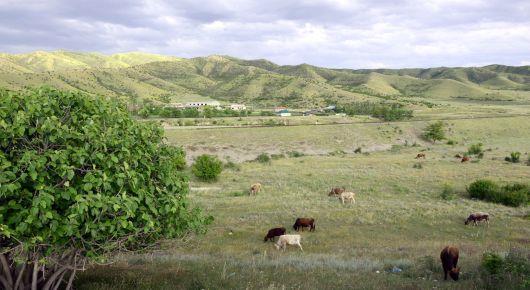GEF allotment helps Azerbaijan and Tajikistan protect natural resources and biodiversity

Today, the Council of the Global Environment Facility (GEF) agreed to support FAO projects in Azerbaijan and Tajikistan worth a total of USD 12.5 million. These projects will contribute to achieving the global Sustainable Development Goals (SDGs), specifically those on sustainable management of water (SDG 6) and life on land (SDG 15).
In the first, two new initiatives will reduce (and reverse) land degradation and conserve the biodiversity of protected areas, while in the second, sustainable water management will be supported with neighbouring Afghanistan.
“FAO, in close coordination with GEF, has been operating natural resources management projects since 2017, thus the approval of two additional proposals is a clear sign of the mutual trust among the three parties,” said Melek Cakmak, FAO Representative in Azerbaijan.
“In an upstream country like Tajikistan, the support of the Global Environment Facility to transboundary water management, combined with FAO expertise, will have a long-term positive impact on its development path of participating countries and other downstream countries of the region,” commented the FAO Representative to Tajikistan, Oleg Guchgeldiyev, on the approval of the project.
Restoring degraded land and biodiversity in Azerbaijan
Soil holds the largest terrestrial carbon pool and plays a crucial role in the global carbon balance by regulating dynamic biochemical processes and the exchange of greenhouse gases with the atmosphere. Therefore, healthy soil and proper land use have beneficial effects on greenhouse gas emissions.
The project titled "Towards a land degradation-neutral Azerbaijan" aims to support national efforts to develop and implement national targets on land degradation neutrality, and pilots sustainable land management on the Absheron Peninsula in the Caspian Sea, contributing to the rehabilitation of degraded lands and improved livelihood resilience.
The project will take a phased approach, starting with a strengthened enabling environment for land degradation neutrality in phase 1, rehabilitating the saline and eroded land of the Absheron Peninsula – the most degraded area in the country – in phase 2, and, finally, upscaling efforts, monitoring, and evaluation.
Another FAO initiative that has received support from the Global Environmental Facility focuses on the conservation and sustainable use of biodiversity to improve the governance and management of Azerbaijan’s protected areas. Additionally, it will contribute to more sustainable management of surrounding production areas by means of a holistic landscape approach.
Special attention will be given to increasing the participation of women in natural resource management, who will be supported to fully participate in training and biodiversity conservation planning, as well as pursue alternative livelihoods, reducing pressure on natural resources in the Hirkan and Shirvan National Parks, both key biodiversity areas in the Caucasus.
Transboundary water management in Tajikistan
The Panj River is a tributary of the Amu Darya, forming a considerable part of the Afghanistan–Tajikistan border. Recent temperature changes have started affecting the Panj River basin, including the water flow and amplifying drought and flood risks.
The five-year FAO project will institutionalize transboundary water management between Tajikistan and Afghanistan for the Panj River Sub Basin. It will support the establishment of a new operational mechanism and foster effective transboundary water management to manage nexus trade-offs in the river basin.
The two countries will jointly conduct a diagnostic analysis that considers climate change, environmental flows, and development trade-offs, which will serve as the baseline for a transboundary water management strategy and action programme. Subsequently, countries will pilot joint water management and climate change actions for effective drought and flood risk mitigation, sustainable water, and land management, and share results and experiences.
The project also aims to improve knowledge of key partners, reinforce participatory processes, and mainstream gender equality.
11 December 2020, Budapest, Hungary
